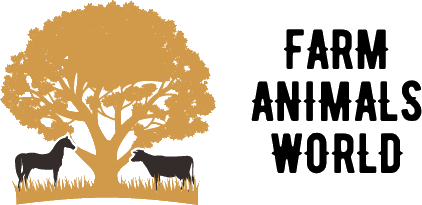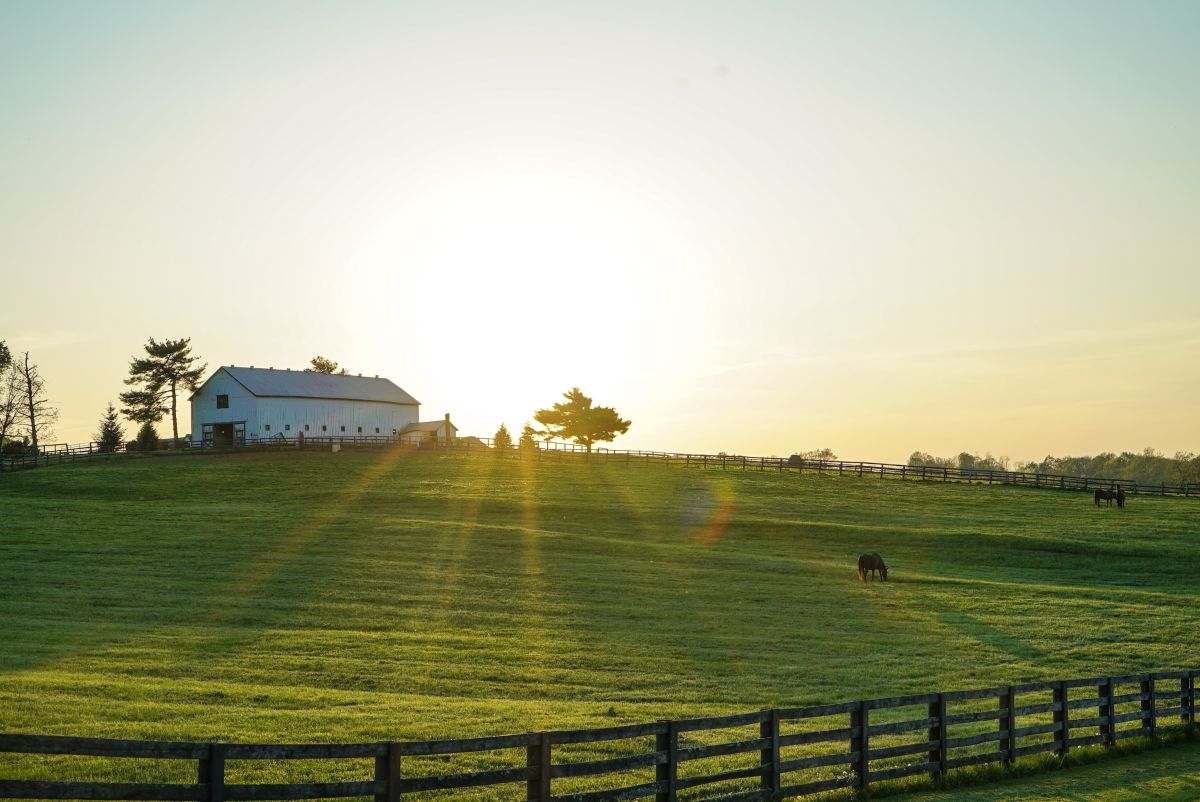Are you looking for an easy way to get your feet wet in the world of farming without committing to high-maintenance animals? Imagine a rainbow of low maintenance farm animals, each bringing its unique benefits.
From chickens to cows, turkeys to alpacas, this article will explore the many advantages of having low-maintenance farm animals.
Key Takeaways
- Poultry (Chickens, Ducks, Turkeys) require minimal feed requirements and simple housing needs.
- Small Animals (Rabbits, Goats, and Alpacas) have minimal housing requirements and a straightforward breeding process.
- Large Animals (Cows, Pigs, Sheep) need adequate space, regular health checks, and understanding of animal behavior.
- Bees require minimal maintenance and offer increased crop yield through pollination.
The Ease of Raising Chickens
You’ll find that raising chickens is relatively low maintenance! Feed requirements are minimal for keeping chickens healthy and happy, requiring only a consistent supply of a commercial feed mix, fresh water, and occasional treats.
Housing needs are also simple, with a sturdy coop and enough outdoor space to allow chickens to roam and forage. Disease prevention can be managed through regular care, such as cleaning the coop and providing adequate ventilation.
Egg production is a benefit to raising chickens, with hens laying eggs on a regular basis. Cost considerations are also a factor, as the upkeep of chickens is pretty inexpensive.
All in all, raising chickens is a great way to enjoy a low maintenance farm animal!
The Benefits of Keeping Rabbits
You can easily enjoy the benefits of keeping rabbits, as they’re low maintenance animals!
For starters, they require minimal housing; an enclosed area no bigger than 8×10 feet is sufficient.
Secondly, their diet is simple – a balanced mix of hay, fresh vegetables, pellets, and water is all they need.
Third, breeding rabbits is a relatively straightforward process requiring no special equipment.
Fourth, rabbits are generally quite healthy and require minimal veterinary care.
Lastly, grooming is easy; brushing them once or twice a week is all that is needed.
All in all, rabbits are an incredibly low maintenance animal to keep and a great source of companionship and entertainment.
Why You Should Consider Ducks
If you’re looking for a low-maintenance animal to add to your farm, ducks can be a great option! When choosing ducks, you must decide which breed suits your needs. There are many breeds, so research different species and their characteristics.
Ducks are easy to feed, as they can feed on various grains, vegetables, and proteins. When it comes to housing ducks, they require a dry shelter with plenty of space for them to move around. You’ll also need to provide your ducks with a pond or pool of water to play and bathe in.
In addition to this, regular health checks are necessary to ensure your ducks stay healthy and happy. Ducks are a great choice if you’re looking for a low maintenance animal for your farm.
The Simplicity of Caring for Goats
Caring for goats is surprisingly simple, requiring just a few basic steps.
Selecting the right breed of goat is crucial, as some goats are more suitable for milk production, while others are better suited for meat production. When selecting a breed, research the fencing requirements, feed requirements, and health care needs for the particular breed.
Once you have chosen the right breed, you’ll need to provide adequate housing and look into the best feed type for the breed. Make sure to have a secure fence to keep your goats in and predators out.
Goats need regular health checkups to stay healthy and disease-free, so be sure to find a reliable veterinarian.
With the right breed, proper housing, adequate feed, and regular health care, you can ensure that your goats stay in top condition.
The Advantages of Having Bees
Having bees can offer a variety of advantages, and they require minimal maintenance. Beekeeping basics include knowing how to maintain the hive properly and understanding the behavior of bees. Hive maintenance involves keeping the hive clean and in good repair while understanding bee behavior will help you identify when something is wrong.
Pollinating plants will help increase the yield of crops and can produce honey that can be sold or made into candles and other products. Monitoring bee health to ensure the colony is thriving is also important.
When cared for properly, bees can offer those who keep them abundant benefits and require minimal maintenance.
Understanding the Maintenance of Pigs
You’ll need to understand the necessary maintenance of pigs if you consider adding them to your farm.
Pigs need adequate space to roam and require well-ventilated and warm housing.
They should be given a nutritionally balanced diet and access to fresh water to keep them healthy.
Their grazing needs should also be met, with access to pastures or grassy areas.
In addition to their feeding habits, it’s also important to be aware of their behavior patterns, such as how they interact with other animals.
Finally, you should monitor their health and be aware of potential health concerns.
With proper maintenance, pigs can be a great addition to any farm.
The Joys of Keeping Sheep
Keeping sheep can be a joyous and rewarding experience. Understanding their feeding habits, breeding strategies, shearing tips, shelter needs, and lambing season is crucial.
Feeding sheep can range from hay and grass to a more specialized diet, depending on their age and health.
Breeding should be done carefully and strategically, knowing when to separate rams and ewes and when not to.
Shearing sheep is a skill that must be done carefully and correctly with the right tools.
The shelter can be a mix of both manufactured and natural, like a shed and a field.
Lastly, lambing season is a beautiful experience and should be done with care and attention to the mother and her young.
With the proper care, sheep can be a pleasure to raise.
The Low Maintenance of Alpacas
If you’re looking for a low-maintenance farm animal, alpacas are a great choice! Their diet is simple and affordable, usually consisting of hay, pellets, and occasional treats. Alpacas are also often docile and easy to handle, making them great for all ages of ranchers.
Their housing needs are minimal, and they’re relatively hardy regarding weather extremes. From their fiber products to their meat, alpacas offer a variety of products that can be sold or used for personal use.
Lastly, alpacas are generally low maintenance when it comes to health, often needing only basic vaccinations and hoof trimming. With all these benefits, it’s no wonder alpacas are such a popular choice for low maintenance ranching.
The Practicality of Keeping Cows
Caring for cows can be a practical and rewarding experience. You’ll start by selecting the right breed when choosing a cow. Some species are better for milk production, while others are better for beef production.
Next, consider the necessary housing for your cow. You’ll need a sheltered area with plenty of space, which should be well-ventilated and dry.
Regarding feeding, cows require a balanced grass, hay, and grain diet. It’s necessary to ensure that your cow gets enough nutrients and that their diet suits their specific breed.
Lastly, keep a regular schedule for milking and health checks. This will ensure your cow is healthy and produces a steady milk or beef supply.
With the proper care, cows can be a practical and rewarding experience.
The Rewards of Raising Turkeys
Raising turkeys can be a rewarding experience, providing you with delicious meat and eggs. When choosing which breeds to raise, consider size, egg production, and meat quality. It’s also important to research the health concerns involved with each particular breed.
Turkeys must be fed a balanced diet with a mix of proteins, fats, and carbohydrates. Additionally, there are a few feeding tips to consider, such as providing feeders explicitly designed for turkeys and avoiding over-supplementation.
Regarding shelter, turkeys do best with confinement options that provide adequate ventilation and protection from predators. Consider building a shed or using a coop.
With careful planning and attention to the needs of your turkeys, you’ll reap the rewards of a thriving flock.
Frequently Asked Questions
What Are the Best Housing Options for Farm Animals?
Creating the perfect housing for your farm animals is critical for any farmer. To make sure your animals are safe and healthy, you should consider several key elements:
- Pasture fencing: It’s essential to create an appropriate amount of pasture fencing to ensure your animals have enough space to roam freely.
- Feed storage: Feed storage should be secure and dry to prevent contamination.
- Animal health: Animal health should be monitored regularly to prevent and detect any potential issues.
- Pest control: Any pests should be managed with proper pest control measures to protect the health of your animals.
- Shelter design: Shelter design is essential for providing animals with a safe and comfortable home.
You can create an ideal housing environment for your farm animals with the right combination of these elements.
What Is the Cost Associated With Raising Farm Animals?
The costs associated with raising farm animals can vary depending on the type of animal, the climate, and the size of the operation. Feeding costs will depend on the type and quantity of feed needed for the animals and any supplements required. Medical care for the animals is likely an ongoing expense, so it’s necessary to factor in potential veterinary bills.
Climate needs should also be considered, as some animals may require additional shelter or heating in colder months. Grazing areas must be large enough to accommodate the livestock, and any necessary fencing must be factored into the cost.
How Much Space Is Needed for Farm Animals?
When it comes to raising farm animals, the amount of space you need depends on a variety of factors. Grazing requirements, shelter needs, medical costs, nutritional needs, and breeding considerations must be considered.
For example, raising chickens requires at least four square feet per bird in a coop and 10-20 square feet per bird in an outdoor run. Goats, on the other hand, need at least 100 square feet each, including both indoor and outdoor space. Other animals like sheep, cattle, and pigs also need enough space to meet their specific needs.
Proper care and planning can help ensure your animals have enough space to thrive.
Are There Any Special Dietary Requirements for Farm Animals?
When considering the dietary requirements for farm animals, there are a few things to keep in mind.
Feeding needs, shelter costs, space requirements, transportation issues, and healthcare costs all come into play. Depending on the type of animal, the amount and type of feed required can vary significantly. Certain animals may also require specialized feed.
Additionally, shelter needs to be provided, and transportation and health care costs must be factored in.
These factors can help ensure that the animals receive the proper nutrition and care.
Are Farm Animals Difficult to Transport?
Transporting farm animals can be challenging, but it’s necessary for their management and welfare. Regulations and costs are important considerations, as is the stress the animals may experience.
To ensure animal health and safety, limiting the time spent in transport and monitoring the environmental impacts is necessary. Transport regulations may vary depending on the type of farm animal, so it’s important to research and follow the appropriate guidelines.
Transport costs can be substantial, so it’s crucial to consider the long-term impacts of transport on the animals and the environment. Ultimately, the goal should be to minimize stress and environmental impacts while ensuring animal health and safety.
Conclusion
Many farm animals are relatively low maintenance, making them perfect for anyone looking to get into animal husbandry. Chickens, rabbits, ducks, goats, bees, sheep, pigs, alpacas, cows, and turkeys each offer unique rewards, making the experience of raising them like a box of chocolates; you never know what you’ll get!
You can find the perfect farm animal for your needs with careful research and consideration.

